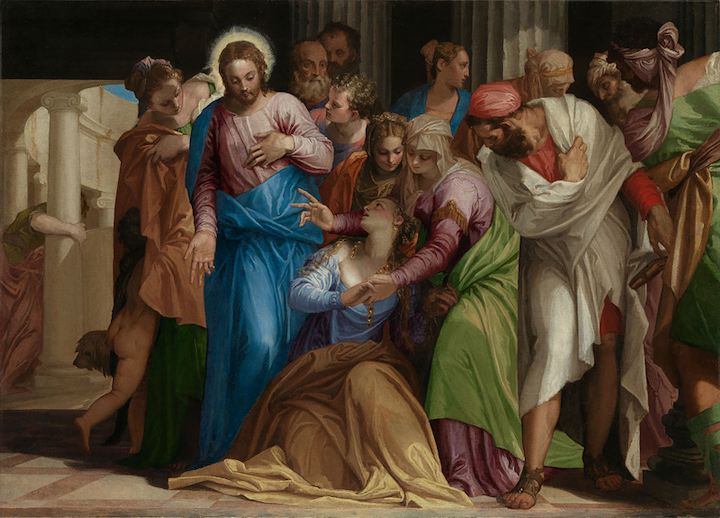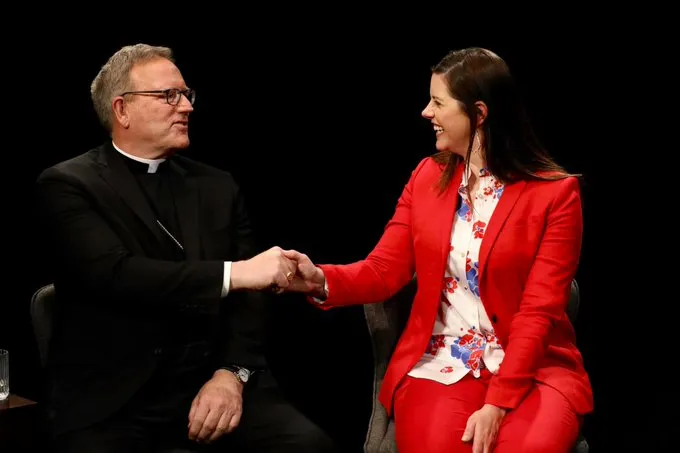Since entering the Catholic Church in 1997, I’ve occasionally given talks about my conversion from Protestantism to the Catholic Faith. I usually focus on eight people who played an essential role in that process.
Among them are my parents (who remain Fundamentalists), T.S. Eliot, Chesterton, and Walker Percy – also Newman, Knox, C.S. Lewis, Dorothy Sayers, Charles Williams, and Flannery O’Connor.
I discovered Eliot and Lewis as a teen; I was introduced to the writings of O’Connor, Williams, and Gerard Manley Hopkins at Bible college. Literature opened the door through which theology and doctrine entered like cool, fresh waters for me. One without the other would have left something lacking. O’Connor’s startling stories, for instance, opened my mind to a sacramental vision of reality, just as Eliot’s poetry challenged my shallow grasp of the Incarnation.
All this came to mind recently while I was reading a brief essay by Jessica Hooten Wilson titled “The Ecumenical Imagination”. Wilson has written several excellent articles and books on Percy and O’Connor, has appeared on EWTN and “Bishop Barron Presents,” and has taught and lectured at several Catholic institutions, including my alma mater, the University of Dallas.
She is currently studying Dorothy Day, Sigrid Undset, and Edith Stein, and expresses her love for the Catholic Church: “the sacramental imagination, the reverence for saints, the beauty of their literature and tradition, the encouragement of life and large families.”
But Wilson is not Catholic.
“I am fully and delightfully Protestant,” she writes, “at home in the Anglican Church, the middle way, which I do not see as a road on its way to anywhere but paradise.” Further: “I used to say that I was Catholic theologically and literarily, but Protestant ecclesially. But the more accurate truth is that I’m just Anglican.”
Wilson apparently gets annoyed that people ask her why she’s not Catholic, saying this question “appears to them to be a necessary reflection for every believer.” But it’s a reasonable question: she’s a Protestant whose work focuses on Catholic authors and “the Catholic imagination.” Catholics ask the question because they understand that Protestantism rejects many of the things she loves about the Catholic Faith.
She notes that the Catholic art historian Elizabeth (“Liz”) Lev, in an apparently private conversation, “approved of my reasons. With an authority and confidence that only Liz Lev can assert, she declared my choice to be sound.”
Lev is a wonderful art historian, but the authority attributed to her here is puzzling, as no Catholic has the “authority” to tell a non-Catholic to remain outside the Church. Further – and here is where theological distinctions demand attention – the Anglican Communion, whatever graces exist therein, is not a “church” in the eyes of the Catholic Church.

As the Congregation for the Doctrine of the Faith explained in June 2007, those “Christian Communities born out of the Reformation of the sixteenth century do not enjoy apostolic succession in the sacrament of Orders, and are, therefore, deprived of a constitutive element of the Church.” Anglican communities do not have valid holy orders or the Eucharist, and so “cannot, according to Catholic doctrine, be called ‘Churches’ in the proper sense.”
This is not triumphalist or arrogant; it’s simply Catholic, factual, vital. Despite many examples to the contrary, the Catholic Faith is not a buffet. “A convert comes to learn,” wrote Newman, “and not to pick and choose.” It’s all or nothing – and Wilson appears to acknowledge this fact.
One reason she gives for not becoming Catholic is underwhelming: while studying at Baylor University, she was advised by Ralph Wood – a self-described “Bapto-Catholic” who helped start “an Anglican church ” – “Never leave the tradition that gave you the gospel.”
“I took that to heart,” says Wilson, “that missionary call to be a bridge between the good I find in one church and the home I find in the other.”
I wonder if Wood – author of books on O’Connor, Chesterton, and Tolkien – would have given such advice to, say, Newman, Chesterton, Knox, Christopher Dawson, Evelyn Waugh, Robert Hugh Benson, and so many others?
And more importantly: Would they have taken it?
Further, this avoids confronting the deeply fractured nature of Protestantism, which has countless competing (and mutually denouncing) traditions. Wilson herself was raised in the Churches of Christ, then attended Baylor (a Baptist-affiliated school), and is now Anglican. Having left the tradition of her youth, she apparently views the vague Protestant tradition as the one that gave her the Gospel.
I was raised in a small Fundamentalist Bible Chapel affiliated with the Plymouth Brethren movement; I became Catholic precisely because I learned how the Plymouth Brethren movement came out of Anglicanism and Methodism, which resulted from Henry VIII’s break with the Catholic Church.
Turns out, it was Catholic Tradition that gave me the Gospel.
The essential problem here is ecclesiology. Wilson invokes the “middle way” of Anglicanism, which is an appealing but empty mythology. Perhaps I am being kind in saying so. Abbot John Chapman (1865-1930), a former Anglican who entered the Catholic Church in his twenties, wrote, “The divisibility of the Church is the cardinal doctrine of Anglicanism, and its most fundamental heresy.”
Wilson is clearly (and understandably) enamored with the Catholic imagination, but seems intent on running around both Catholic doctrine and the Church herself. But all great Catholic literature, art, and music flows from the whole of Catholic dogma doctrine, devotion, and practice.
A good friend earned his doctorate in English from Baylor shortly after Wilson graduated. An Evangelical Protestant, he entered the Catholic Church at Baylor. After reading Wilson’s post, he wrote to me: “Is what the Catholic Church says about herself true? If not, then she is not worthy of your admiration. If so, your obedience is not a matter of choice – or rather, your choice is not without consequence.”
To which I add: Jesus Christ did not found Protestantism or Anglicanism – and it doesn’t take much imagination (Catholic or otherwise) to see the Church he did establish at Pentecost.

*Image: The Conversion of Mary Magdalene by Paolo Veronese, c. 1548 [National Gallery, London]
You may also enjoy:
Stacy Trasancos’ Doing the Calculus: A Love Story
Brad Miner’s Conversion Story















